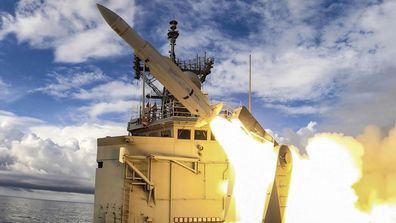The Pentagon is reviewing the trilateral agreement, putting the future of Australia’s submarine fleet in question.
“The department is reviewing AUKUS as part of ensuring that this initiative of the previous administration is aligned with the President’s America First agenda,” a US defence official confirmed to 9News.

“As (Defence Secretary Pete Hegseth) has made clear, this means ensuring the highest readiness of our service members, that allies step up fully to do their part for collective defence, and that the defence industrial base is meeting our needs. This review will ensure the initiative meets these common-sense, America First criteria.”
Another official had said the Donald Trump administration was “regularly” reviewing agreements with other countries to ensure they were to the benefit of the US, especially if they had been established under Trump’s predecessor Joe Biden.
The AUKUS agreement, a trilateral defence agreement between the US, Australia, and the UK, was established under Biden, then-Prime Minister Scott Morrison, and then-UK Prime Minister Boris Johnson in 2021.
One of the chief pillars of the agreement from Australia’s perspective was the decision for Canberra to purchase nuclear-powered submarines in a $368 billion deal as an enhanced deterrent.

However, broader technology and defence sharing was also enshrined in the agreement.
Defence Minister Richard Marles played down the implication of the review, pointing out another apparently similar process recently took place in the UK and ended with renewed approval for the agreement.
He said it was a “natural” step for Washington to take with a new administration at the reins, and that Australia remained committed to working with the US.
Nationals Senator Bridget McKenzie said securing the AUKUS pact needed to be top priority for Prime Minister Anthony Albanese at a hoped-for meeting with Trump at the G7 meeting in Canberra in coming days.

“Any undermining of this serious and substantial alliance between our two countries should be of grave concern to all of us, because the reality is there is a very real vulnerability for us,” McKenzie said on Today.
“We cannot defend ourselves without these relationships. And so Aukus and the strategic partnership with the US needs to be the Prime Minister’s primary concern.
“And obviously, we wish him every success in strengthening that relationship and not weakening it.”
John Bolton, who was the White House national security advisor in the first Trump White House from 2018-2019, said he was “very disturbed” by news of the review.
“The AUKUS deal was one of the Biden administration’s biggest achievements from the US perspective, and even to call it into question in the form of a review is a bad signal of the of the ultimate intention by the Trump administration,” Bolton told Today.
“I don’t think they’re reviewing it to consider increasing the size of the deal. I think it’s more a question of how much of a downsize they’re looking at, including potentially total cancellation, which would be catastrophic, a huge mistake for the US with enormous consequences, obviously, for Australia and the UK.”

He said the review continued a trend of senior US figures concluding that the US did not have the capacity to deal with global problems.
“It’s a very short-sighted view for many reasons, the least of which is if you have capacity problems in military procurement, increase your capacity,” he said.
“That’s in part what AUKUS is going to do. And to say, well, we’ve got to build our own submarines and therefore we can’t build submarines for Australia, is incredibly shortsighted.”
Australia has already paid its first $500 million instalment on the submarine agreement.

The staggering sums countries spend on defending themselves
The AUKUS pact has generally enjoyed bipartisan support in the US and Australia, though critics have questioned the value of the submarine fleet for Australia, especially given the 2030s deadline.
The revelation of the review will add to the pressure on Prime Minister Anthony Albanese when he attends the G7 meeting in Canada this week.






